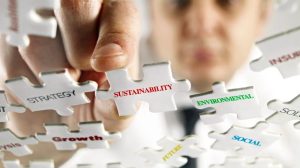Table of Contents
The need for sustainability in business arises from the recognition that our planet’s resources are finite, and that businesses operate in a way that does not deplete or harm these resources. Sustainable business practices promote long-term economic growth while also considering the environmental, social, and governance impacts of business operations.
Sustainability in business is not just a moral imperative but also essential for long-term business success. Consumers, investors, and employees increasingly demand that businesses prioritise sustainability. They recognise the risks and opportunities associated with environmental and social issues. Failing to address these issues can lead to reputational damage, regulatory scrutiny, and legal liabilities.

Businesses that embrace sustainability are also better positioned to adapt to the challenges of a changing world. Climate change, resource scarcity, and social inequality are all pressing issues businesses must address to remain competitive and relevant. By embracing sustainable practices, businesses can reduce their environmental impact, mitigate risks, and create opportunities for innovation and growth.
In short, the need for sustainability in business is clear. When you prioritise environmental, social, and governance concerns, you are doing your part in protecting the planet and its people. This guide will explore strategies you can adopt to transform your business for a sustainable future.
4 Strategies For Transforming Your Business For A Sustainable Future
1. Reduce Your Environmental Footprint
In today’s market, when customers are increasingly mindful of the environmental footprints of brands, businesses must take steps to become more eco-friendly or risk falling behind the competition.

Here are some strategies to help your business become more sustainable by reducing your environmental footprint.
- Conduct An Energy Audit: An energy audit will help you identify areas where you are consuming the most energy and where you can implement energy-saving measures. This could involve switching to LED lighting, installing motion sensors, and investing in energy-efficient appliances.
- Reduce Waste: Waste reduction strategies include reusable products, recycling, and composting. You can also encourage employees to reduce waste by offering incentives and training programs.
- Switch To Sustainable Products And Services: Switching to more sustainable products and services can also help reduce your environmental footprint. This could involve sourcing environmentally friendly office supplies, using renewable energy sources, and choosing suppliers with sustainable practices.
- Implement Sustainable Transportation: Encouraging sustainable transportation practices can also help reduce your environmental footprint. You could offer incentives for employees who carpool, cycle to work, or even provide electric vehicle charging stations. Additionally, you can encourage your employees to lease electric cars. Check out LV ElectriX for a guide to choosing your electric car.
- Develop A Sustainability Plan: This plan can help ensure that your business takes a holistic approach to sustainability. It should include specific targets and timelines and be regularly reviewed and updated.
Reducing your environmental footprint benefits the environment, helps reduce operating costs, and enhances your brand reputation. By implementing these strategies, you can help ensure your business does its part to create a sustainable future.
2. Develop Sustainable Supply Chains
A sustainable supply chain involves sourcing materials, goods, and services to minimise environmental impact and ensure ethical and fair practices throughout the supply chain. To develop a sustainable supply chain, you can start by assessing your suppliers and identifying areas to improve. This could involve sourcing materials and products from local suppliers to reduce transportation emissions, choosing suppliers who use sustainable practices, and setting environmental standards for your suppliers.
When you develop a sustainable supply chain, you’re helping your business reduce its environmental impact. You’ll also enhance your brand reputation while meeting the growing demand for sustainable products and practices.
3. Engage Your Employees and Customers
Employees and customers are the key stakeholders in any business, and their support and involvement are essential for achieving sustainability goals. By engaging with your employees, you can create a sustainability team that will drive sustainability initiatives throughout the business. You can also provide training and education programs to increase awareness of sustainability issues, encouraging them to take part in sustainability activities.

Communicating your company’s sustainability efforts and progress through marketing materials, social media, and website content is one way to get your consumers involved. You can also encourage your customers to take part in sustainability initiatives by offering incentives, such as discounts or donations to environmental organisations.
4. Develop A Sustainability Plan
This plan will outline your business’s sustainability goals, strategies, and timelines, providing a roadmap for achieving sustainability objectives. You can develop a sustainability plan by assessing your business’s environmental impact and identifying areas to improve. This could involve conducting an energy audit, assessing your waste management practices, and analysing your supply chain.
Based on your assessment, you can set specific sustainability targets and identify strategies for achieving them. These could include implementing energy-saving measures, reducing waste, switching to sustainable products and services, and engaging your employees and customers in sustainability initiatives.
Your sustainability plan should be regularly reviewed and updated to remain relevant and effective. Creating a sustainability plan demonstrates your dedication to sustainability and gives you a road map for making your company eco-friendlier.


